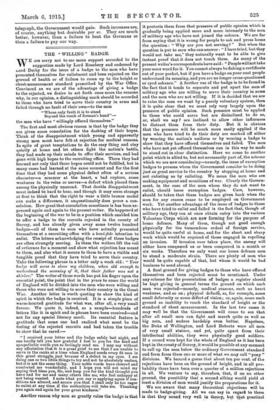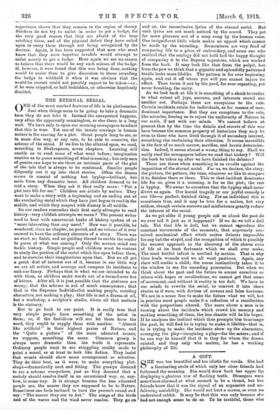THE "WILLING" BADGE.
WE are sorry not to see more support accorded to the suggestion made by Lord Roaebery and endorsed by i,ord Derby for the issue of a badge to the men who have presented themselves for enlistment and been rejected on the ground of health or of failure to come up to the height or chest-measurement standard prescribed by the War Office. Convinced as we are of the advantage of giving a badge to the rejected, we desire to set forth once more the reasons why, in our opinion, a distinguishing mark should be accorded to those who have tried to serve their country in arms and failed through no fault of their own—to the men
"Whose only fault it is to stand
Beyond the reach of foeman's hand"—
the men who have " willingly offered themselves."
The first and most obvious reason is that by the badge they are given some consolation for the dashing of their hopes. Think of the disappointment which young and apparently strong men must have felt at rejection for medical reasons. In spite of great temptations to do the easy thing and stay quietly at home and let others fight the nation's battle, they had made up their minds to offer their services, and had gone with high hopes to the recruiting office. There they had learned not only that those hopes could not be fulfilled, but in many cases had learned at the same moment and for the first time that they had some physical defect often of a serious character—a murmur at the heart, a bad rupture, some weakness in the veins or nerves—a defect which placed them among the physically unsound. That double disappointment must indeed be hard to bear, and though it may seem strange at first to think that the right to wear a little bronze medal can male a difference, it unquestionably does prove a con- solation. How great that consolation sometimes is has been ex- pressed again and again to the present writer. He happened at the beginning of the war lobe in a position which enabled him to offer a badge to the recruits rejected in the county of Surrey, and has already given away some twelve hundred badges—all of them to men who have actually presented themselves at a recruiting office with a bones-fide intention to enlist. The letters acknowledging the receipt of these badges are often strangely moving. In them the writers lift the veil of reticence for a moment and show what rejection has meant to them, and also what it means to them to have a visible and tangible proof that they have tried to serve their country. Take the following phrase in a letter only a week old : "Your badge will serve to show my children, when old enough to understand the meaning of it, that their father was not a shirker." The writer of those words has put his finger upon the essential point, the point that in the years to come the world of England will be divided into the men who were willing and those who were not willing to serve their country in the Great War. Another letter is worth quoting to show the kind of spirit in whioh the badge is received. It is a simple piece of warm-hearted gratitude for what was, after all, a very small favour. We quote it, indeed, as a sample—hundreds of letters like it in spirit and in phrase have been received—and not for any special literary merit. Its essential feature is gratitude that some one had realized what must be the feeling of the rejected recruits and had taken the trouble to show that he cared:— " I received your letter and the badge safely last night, and can hardly tell you how grateful I feel to you for the kind and sympathetic words you so feelingly send me. I may say without any affectation that it is a great grief to me that I am unable to serve in the ranks at a time when England needs every fit man in this great struggle, just because of a defect in my eyes. I am doing one or two little things to try and not be absolutely useless, but it is not the same thing. Your noble words have cheered and comtorted me wonderfully, and I hope you will not mind my saying God bless you, Sir, and keep you for the kind thought you have had for me and many others like me, who feel unhappy at not being wanted. I note what you say re applying again if con- ditions are altered, and assure you that I shall only be too eager to enlist at any time if the authorities will take rue. Thanking you again and again for your great kindness."
Another reason why men no greatly value the badge is that it protecte them from that measure of public opinion which is gradually being applied more and more intensely to the men of military age who have not joined the colours. We are far from saying that it is wrong for people to ask and press home the question, "Why are you not serving P" But when the question is put to men who can answer, "I have tried, but they would not take me." they naturally want to be able to give instant proof that it does not touch them. As many of the present writer'e correspondents have said: "People willnot take your mere word for it. You cannot always be fishing a certificate out of your pocket, but if you have a badge on your coat people understand its meaning, and you are no longer cross-questioned or eyed askance." A. further use of the badge is to be found in the feet that it tends to separate and put apart the men of military age who ELM willing to serve their country in arms and the men who are not willing. If it is decided that we are to raise the men we want by a purely voluntary system, then it is quite clear that we must rely very largely upon the pressure of public opinion. Such pressure must be applied to those who could serve but are disinclined to do so, or, shall we say P are inclined to allow other influences to distract them from their duty. But it is obvious that the pressure will be much more easily applied if the men who have tried to do their duty are marked off either by wearing the nation's uniform or by wearing a badge to show that they have offered themselves and failed. The men who have not yet offered themselves can in this way be made to stand out in cleat. distinction. Here we come to another point which is allied to, but not necessarily part of, the scheme which we are now considering—namely, the issue of exemption badges to persons whom the Government consider to be doing just as great service to the country by stopping at home and not enlisting as by enlisting. We mean the men who are making equipment and munitions of war. Clearly the Govern- ment, in the case of the men whom they do not want to enlist, should issue exemption badges. Care, however, should be taken that these badges are given back when the men for any reason ceatio to be employed on Government work. Yet another advantage of the issue of badges to those who have tried to enlist and failed is the fact that, though of military age, they can at once obtain entry into the various Volunteer Corps which are now forming for the purpose of home defence. Many of them, though not good enough physically for the tremendous ordeal of foreign service, would be quite useful at home, and for the short and sharp work which would be required of those engaged in repelling an invasion. If invasion ever takes place, the enemy will either have conquered us or been conquered in a month or six weeks. Therefore we only want our home defence men to stand a moderate strain. There are plenty of men who would be quite capable of that, but whom it would be bad business to send abroad, A final ground for giving badges to those who have offered themselves and been rejected must be mentioned. Under any scheme for the presentation of badges a register should be kept giving in general terms the ground on which each man was rejected—namely, medical reasons, such as heart weakness, and so on ; physical defecte, as, for example, some small deformity or some defect of vision ; or, again, some such ground as inability to reach the standard of height or the standard of chest measurement. In the last two cases it may well be that the Government will come to see that after all small men can fight and march quite as well as big men, and endure hardship even better. Napoleon, the Duke of Wellington, and Lord Roberts were all men of very small stature, and yet, quite apart from their intellectual abilities, they were physically good soldiers. If a record were kept for the whole of England as it has been kept in the county of Surrey, it would be possible at any moment to call up the men below the ordinary Government standard and form from them one or more of what we may call "pony" divisions. We hazard a guess that about ten per cent, of the rejections have been on the ground of height, and in all pro- bability there have been over a quarter of a million rejections in alL We venture to say, therefore, that, if on no other ground, the possibility that a second sifting would yield at least a division of men would justify the preparations for it.
We are aware that many theoretical objections will be made to badge-giving. All we can say in regard to theta is that they sound very well in theory, but tkat practical
experience shows that they remain in the region of theory. Shirkers do not try to enlist in order to get a badge, for the very good reason that they are afraid of the trap catching them, and of the physical defect they have relied upon to carry them through not being recognized by the doctors. Again, it has been suggested that men who must know that they were hopeless invalids would attempt to enlist merely to get a badge. Here again we see no season to believe that there would be any each misuse of the badge. lf, however, it were found that this was being done, nothing would be easier than to give discretion to those awarding the badge to withhold it when it was obvious that the would-be recruit could not possibly expect to be taken—i.e., if he were crippled, or half bedridden, or otherwise hopelessly disabled.











































 Previous page
Previous page